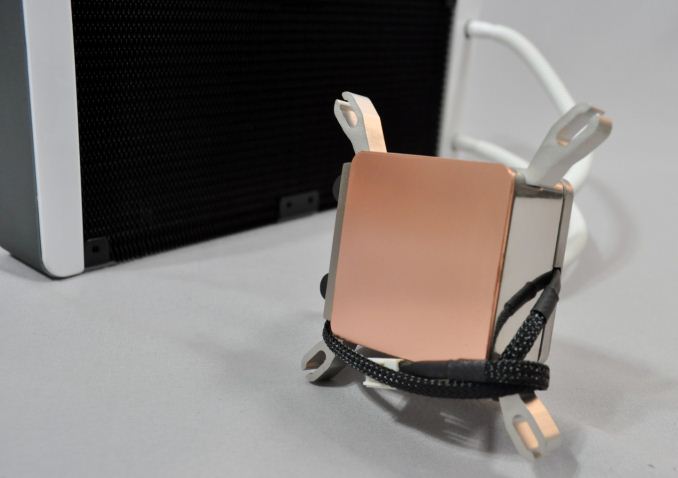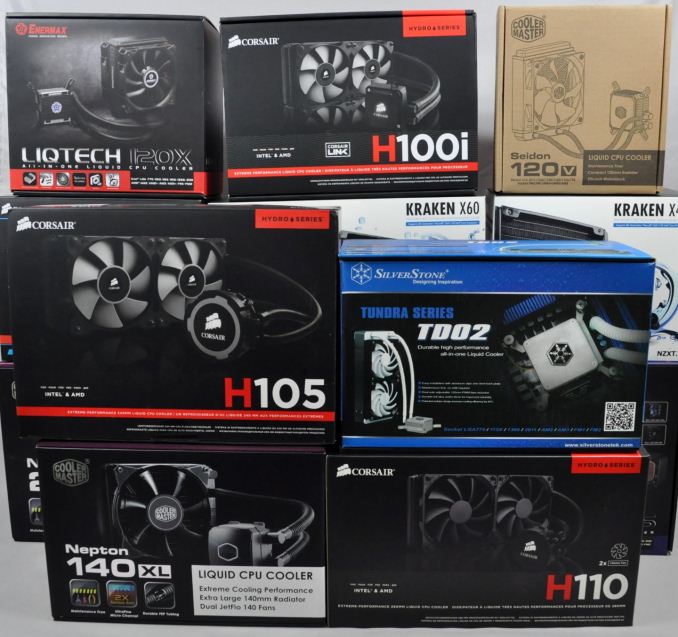Closed Loop AIO Liquid Coolers: 14-way Mega Roundup Review
by E. Fylladitakis on February 12, 2014 7:00 AM EST
Remember the time when liquid cooling a computer chip was considered to be an extreme approach, one performed by hardcore enthusiasts and overclockers alone? Everything had to be personally designed and or procured by the user, as there were no specialized commercial products available at the time. Radiators were modified heater cores extracted from cars, CPU blocks were rare and occasionally machined at local workshops using a copper block and a lathe, while high-performance tubing came from shops with medical supplies.
As demand grew, aided by the ever-increasing noise of small CPU heatsinks, companies specializing on liquid cooling solutions began turning up -- a little too fast perhaps, as tens of companies were founded within a few months' time and very few of them actually survived for more than a couple of years. Enthusiasts could then buy specialized liquid cooling equipment and even whole kits from just one seller and only had to assemble the setup into their system. That of course is no simple process for an amateur and a nightmare for a system builder, who cannot ship a system with a topped off water cooling tank or assume that the user has the skills required to maintain such a system, therefore the potential market remained limited to advanced users only.
This all changed in 2012, when Asetek came up with an inexpensive closed loop solution, a liquid cooling device that was leak-free and required no maintenance at all. The radiators of the first few solutions were small and their overall performance hardly better than that of air coolers; however, aided by the modernization of computer cases, the mounting of larger, thicker radiators inside a PC soon was not a problem. In many cases the kits were now no harder to install than any CPU cooler and required no maintenance at all, opening the market to virtually every computer user seeking a performance cooling solution. This spurred massive interest amongst OEMs and manufacturers, who all strive for a slice of the pie.
There have been tens of AIO (All-in-One) closed loop liquid coolers released just in 2013; today, we are having a roundup with 14 of them, coming from five different manufacturers, alphabetically listed in the table below.
| Product | Radiator Effective Surface | Radiator Thickness | # of Fans (Supplied / Maximum) | Speed Range of Supplied Fans (RPM) | Current Retail Pricing |
| Cooler Master Seidon 120V | 120mm × 120mm | 27mm | 1 / 2 | 600-2400 | $49.99 |
| Cooler Master Nepton 140XL | 140mm × 140mm | 38mm | 2 / 2 | 800-2000 | $99.99 |
| Cooler Master Nepton 280L | 140mm × 280mm | 30mm | 2 / 4 | 800-2000 | $119.99 |
| Corsair H75 | 120mm × 120mm | 25mm | 2 / 2 | 800-2000 | $69.99 |
| Corsair H90 | 140mm × 140mm | 27mm | 1 / 2 | 600-1500 | $84.99 |
| Corsair H100i | 120mm × 240mm | 27mm | 2 / 4 | 800-2700 | $109.99 |
| Corsair H105 | 120mm × 240mm | 38mm | 2 / 4 | 800- 2700 | $119.99 |
| Corsair H110 | 140mm × 280mm | 29mm | 2 / 4 | 600-1500 | $126.99 |
| Enermax Liqmax 120S | 120mm × 120mm | 32mm | 1 / 2 |
600-1300 600-2000 600-2500 (Multi-range) |
$163.00* |
| Enermax Liqtech 120X | 120mm × 120mm | 43mm | 2 / 2 |
600-1300 600-2000 600-2500 (Multi-range) |
$171.10* |
| NZXT Kraken X40 | 140mm × 140mm | 27mm | 1 / 2 | 800-2000 | $89.99 |
| NZXT Kraken X60 | 140mm × 280mm | 27mm | 2 / 4 | 800-2000 | $119.99 |
| Silverstone Tundra TD02 | 120mm × 240mm | 45mm | 2 / 4 | 1500-2500 | $118.99 |
| Silverstone Tundra TD03 | 120mm × 120mm | 45mm | 2 / 2 | 1500-2500 | $97.99 |
*The coolers from Enermax are not widely available in the USA at the time of this review, with the only viable option appearing to be that of import from Asia or Europe.
Although Asetek was the first to come up with the design and they hold patents for it, they are not the only OEM of AIO cooling solutions today. At least three different OEMs are behind the kits listed in the table above. We will have a closer look at each one of them in the following pages.











139 Comments
View All Comments
piroroadkill - Wednesday, February 12, 2014 - link
This is great, but where's at least a couple of air coolers in there for reference?I'd recommend the ever popular and classic Noctua NH-D14 since it's a widely reviewed, well known reference point.
piroroadkill - Wednesday, February 12, 2014 - link
If only I could edit my reply. I see that there is a category in Bench for CPU coolers. Never mind!ddriver - Wednesday, February 12, 2014 - link
It would still be a good idea to include a few high performance air coolers to compare how they do against the low end h2o coolers.just4U - Thursday, February 13, 2014 - link
Or even a Coolermaster 212 which is pretty much the go-to HSF for standard builds due to cost/cooling performance.MrSpadge - Wednesday, February 12, 2014 - link
Agreed - one standard high performance air cooler for ~50€ would suffice, but not including any feels incomplete.jmke - Wednesday, February 12, 2014 - link
so true, would have been a very good idea to throw in a €20 and €50 air cooler, using one of the 120mm fans to see how these water coolers compare.jmke - Wednesday, February 12, 2014 - link
best performance/noise CPU coolers is the Noctua in their charts. One of the best AIO is the NZXT Kraken X60. Let's see how they stack up:Noctua NH-U14S (2 Fans 100%) 43.1°C / 33.3 dBA / €70
NZXT Kraken X60 (Silent) 41.2°C / 30.5 dBA / €140
is a few °C difference worth an extra €70? is a HSF worth €70?
how important is CPU temperature?
if you don't overclock, keeping CPU temp below max would suffice...
mr_tawan - Wednesday, February 12, 2014 - link
Personally I use closed-loop water cooler(corsair H60) because the large air cooler I used (CM Hyper212) gets in the way of ram modules (people with intel chip does not suffer from this, AFAIK). With water cooler, I can put 4 DIMM on the mainboard without any problems.In my system, there is no significant differences between these two cooler. Water cooler is a little bit louder, btw.
Idonno - Saturday, December 6, 2014 - link
I agree 100%. Plus the sheer weight (on the MB and CPU) and size that an air cooler like the Noctua NH-U14S has to be to be even remotely competitive is absolutely ridiculous.It's not just the better temps that closed loop water coolers provide, it's convenience, accessibility, less strain on critical components and better temps.
All-in-all the higher cost of closed loop water coolers is IMO worth every penny.
E.Fyll - Wednesday, February 12, 2014 - link
Unfortunately, the few air coolers that I still have in my house are outdated. Yet, there will be many air cooler reviews and roundups coming in the near future, with their results directly comparable to those of this review. :)